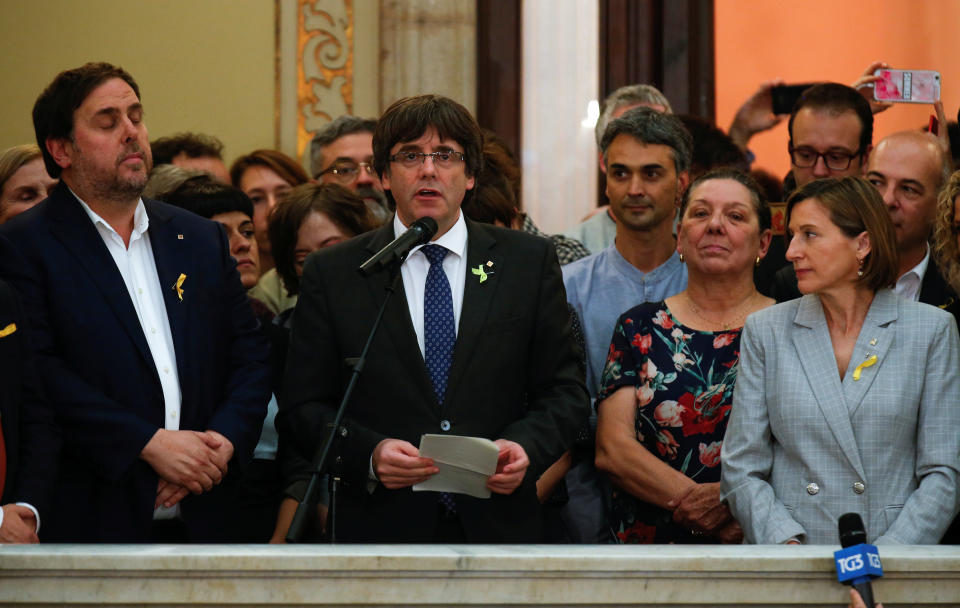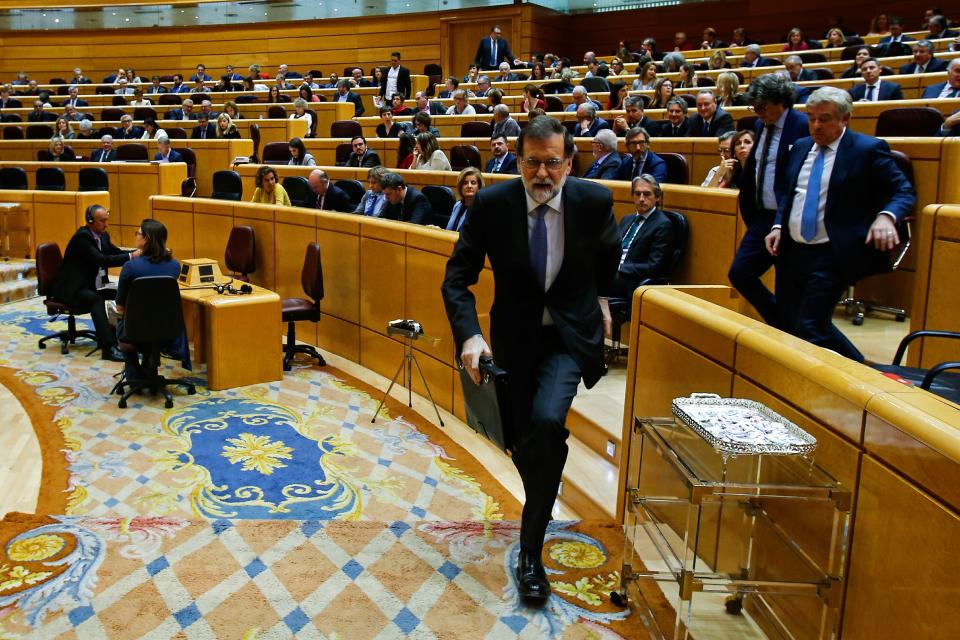On the streets of Barcelona, a sweet dream of independence gone wrong

BARCELONA — Yesterday, on a bustling Friday afternoon, with a warm autumn sun beaming down and a breeze rustling the palm trees, Barcelona, capital of Spain’s northeast region of Catalonia, marked a new chapter after a long drawn-out, confusing and controversial battle. It was a dream stoked by politicians for decades, shaped in schools, and recently fueled by what now appear to be false promises and misguided hopes. The new, sovereign Catalan Republic, with a population of 7.5 million, was born.
Or at least that is what the wily Catalan regional president, Carles Puigdemont, proclaimed after the 135-seat regional Catalan parliament voted (with 70 ayes, 10 noes, 2 abstaining, and the rest of the parliament boycotting the vote) to declare Catalonia independent from Spain, ratifying the results of a regional referendum October 1. Predictably, the declaration was greeted in Madrid in more or less the way Martin Luther’s 95 Theses were greeted in Rome.
For months, Puigdemont and his fellow separatists, who hold a slim majority in the regional parliament, have pushed the dream of an independent Catalonia, a land where residents, among other things, would be weathier, applauded by the international community and would remain part of the European Union. But even before the declaration, all three of these promises were already looking shaky.
More than a thousand businesses have moved their legal headquarters out of the region in recent weeks. Tourism has plummeted by 15 percent from this time last year, and the European Union and most other countries have declared that they do not recognize an independent Catalan Republic. As matters now stand, the new republic will have to survive without the benefits of belonging to the EU, the World Trade Organization and NATO.

Slideshow: Catalan regional parliament declares independence from Spain >>>
Puigdemont had been wavering on independence ever since the referendum, which had been deemed illegal and unconstitutional by Madrid. The vote was marred by police violence and polling fraud and boycotted by the anti-secessionists. An overwhelming 90-10 vote for independence was cast by the 43 percent of eligible voters who did cast a ballot. (Opinion polls over the summer had shown that a plurality of Catalans were in favor of remaining part of Spain, at 49 to 41 percent.)
On Thursday, after postponing, then canceling, his planned speech on the subject, Puigdemont finally tossed the hot potato to the regional parliament. It then fell to him to announce the outcome. “Citizens of Catalonia!” he began his speech. “Hours are coming in which it will fall to all of us to maintain the pulse of the country, of our country, to maintain it in the land of peace, civility and dignity.”
Indeed, the pulse of the new republic began racing minutes later, when the Spanish Senate in Madrid approved the so-called “nuclear option.” Article 155 of the Spanish constitution, never previously invoked, allows the Spanish government to temporarily suspend self-rule in any of Spain’s 17 regions, including Catalonia, which until yesterday enjoyed considerable autonomy. Under the Constitution, secession requires a majority vote of Spaniards nationwide.
Shortly after, Spain’s stern Prime Minister Mariano Rajoy, who had been sparring with Puigdemont for months over the movement to secede, called the Catalan declaration “null and void,” the “kidnapping” of Catalonia by a breakaway faction. Rajoy, leader of the conservative People’s Party, quickly made moves to rope the runaway region back into Spain, dismissing Puigdemont, his vice president, and his cabinet, dissolving the Catalan parliament and calling for new elections on December 21.

The same divisions in Parliament were playing out on the streets of Barcelona. Every other passerby was beaming with excitement for a future where Catalonia, which over the centuries has maintained a distinct culture and language, could chart its own course. This would mean no longer abiding by policies dictated in Madrid, or paying homage to the Spanish throne on which King Felipe VI now sits. It also lets Catalonians off the hook for what secessionists consider an unfair share of the national tax bill.
“Check this out,” said a dog groomer, phone in hand, reading a message from a sibling. “This is the moment that your grandmother has waited for her whole life.” The message was that she should fall in line with the rest of the family, whether she approved of independence or not.
It didn’t seem to matter to the jubilant crowds that Spain had invoked Article 155 and Rajoy had canned the Catalan government. “The sacking’s no surprise,” said one shop owner in the Gothic Quarter, from behind her glass of cava. “We expected it.”
But what was the cause for celebrating independence, if it appeared that it wouldn’t happen, if this was all a symbolic act, a pipe dream? Her companion, Jordi, another shop owner, broke into a smile. “It’s like you have a small football [soccer] team and you’re playing a major team, and they’re winning, 5 to 0. But then you score a goal. You celebrate. Even though you know you’re going to lose the game, you celebrate.”

But every other Barcelona pedestrian on the sidewalks was frowning in consternation. “Where’s Catalonia’s army, navy, and air force?” asked one restaurateur. “They don’t have them, and they don’t stand a chance with independence. Spain won’t let Catalonia go.”
For weeks, supporters of secession were confidently predicting that the European Union, as well as other countries, would come to their aid, politically supporting their independence—even helping them militarily, if needed.
But that seems unlikely, despite an emotional video released by Catalan separatist group Omnium Cultural, begging the world to “Help Catalonia, Save Europe.” Apart from a vague “maybe” from Finland, country after country — Britain, the United States, France, Germany, Italy, Ireland, Indonesia, even Malta, as well as the European Union, have pledged their support for the government in Madrid and withheld recognition of Catalonia.
Russia remains a wild card. President Vladimir Putin last month claimed to back Spain, while Russian media outlets and Moscow’s suspected mouthpiece, Julian Assange, have been conspicuously sympathetic to Catalonia, even comparing Rajoy with Spain’s longtime right-wing dictator Francisco Franco. Putin recently called the EU hypocritical for supporting Kosovo’s independence while ignoring Catalonia, and a Russian senator warned Saturday of potential violence in the region. So far, however, Moscow hasn’t yet taken an official position on independence.
For all of the joyful celebration in the air Friday night, there was a sense that the situation could soon turn ugly. Catalan separatists, including the region’s firefighters, have already vowed “massive civil obedience.” There’s widespread speculation that some officials won’t leave their offices without a fight, and some separatist groups are threatening to occupy Catalonia’s airports, apparently with the intent of shutting them down.
At least one of the city’s major unions called for a 10-day general strike starting Monday. News broke that Friday night’s anti-independence demonstration had turned violent — with protesters breaking the windows of Radio Catalunya, seen as pro-independence, and three demonstrators injured.
The Spanish prosecutor’s office announced its intention to investigate Puigdemont for rebellion, and Rajoy has tapped his deputy prime minister, the no-nonsense Soraya Saenz de Santamaria, as the acting head of the regional government. “It feels like something’s going to kick off, and this could easily turn violent,” says a film maker, “even if it’s a protest gone wrong. And to me, this doesn’t make sense. If it weren’t so disturbing, it would be a comedy.”
Meanwhile, many are wondering what this dream is doing to the economy, and what will happen when the bubble of euphoria bursts. As Andrew Dowling, a Catalan history expert at Wales Cardiff University, told the AP, the Catalan government has “led two million Catalans to believe in independence, so it’s a big problem to tell them now that it’s actually difficult to build a state when Spain has the upper hand of the law on its side. … They are trapped by their own rhetoric.”

“The very worst thing to me,” said a retired investment banker, who transferred all his money out of Catalonia weeks ago, “is what this dream has done to the society. More than it’s turned Catalonia against Spain, it’s turned Catalan against Catalan. And those wounds are going to last.”
Melissa Rossi, a writer based in Barcelona, is the author of the geopolitical series “What Every American Should Know” (Plume/Penguin).
_____
Read more from Yahoo News:
Democrats used to campaign on class — and win. It’s time to do it again.
Behind Flake’s decision to bow out of Senate, a disillusioning, disheartening year
San Juan mayor calls for canceling ‘alarming’ contract for Puerto Rican power repairs
Photos: Catalan regional parliament declares independence from Spain


